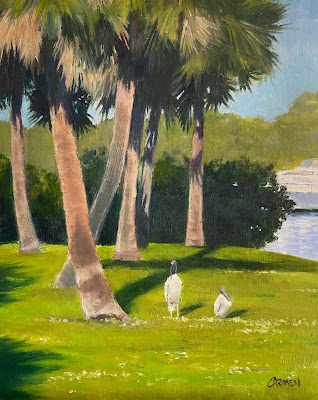-------------------
Donna's response to the challenge
Well this challenge lived up to it's purpose. I was out of my comfort zone in a few ways. For some reason I thought it would be better to use acrylics, not so and I had no idea Cubism would be so restrictive to me!! You have to color inside the lines, which is not good for me.Cubism is breaking down a subject to a basic geometric form and painting it in a flat manner. I picked two very round subjects thinking that would make an interesting contrast.
This is what a dish of pears and a teapot looked to me in a Cubist style.
Donnavinesart.Etsy.com
Donnavinesart.blogspot.com
----------------
Carmen's response to the challenge
Carmen's response to the challenge
"The Death of Truth"
I used Picasso as my inspiration, and the sun/lamp is almost a direct steal from his painting, "Guernica." I think the painting is self-explanatory.
Carmen Beecher
carmensart.etsy.com
carmenbeecher.com
I love Klee, Kandinsky, and Picasso so I had a hard time choosing who to use as my inspiration, but settled on Kandinsky because his art is just fun to me and I thought I could even try it in watercolors. He really worked to make his images with non-representative symbols, just lines, squiggles, dots and geometric shapes so that it inspired a "feeling" rather than a "meaning" for observers.
Above was my "dry run" just using a mix of his favorite symbols and his way of color blocking them and filling in the background. When I discovered, that despite his attempts to avoid representation, he had put a tiny bird in one of his paintings I really felt he was a kindred spirit. So I included one, too. (Click on the image to zoom in and find it.)
Kathy Garvey
Channeling Chagall
While still in college I saw Chagall’s “I and My Village” and was enchanted by the color, the design and the sense of joy he captured on a huge canvas. I’ve always loved his work, but found it hard to copy when the Pieces of 8 project of copying the masters took place almost a decade ago. Trying to capture some of his joy and playfulness in a composition of my own was more fun.
--------------------------
Kathy's response to the challenge
Kathy's response to the challenge
I love Klee, Kandinsky, and Picasso so I had a hard time choosing who to use as my inspiration, but settled on Kandinsky because his art is just fun to me and I thought I could even try it in watercolors. He really worked to make his images with non-representative symbols, just lines, squiggles, dots and geometric shapes so that it inspired a "feeling" rather than a "meaning" for observers.
Then I did a larger piece mimicking elements in some of his more geometric paintings.
While this is representative of his painting style, it has meaning (at least to me) as each Kandinsky inspired circle contains the first initial of one of my ten grandchildren.
Kathy Garvey
-------------------------
Mary's response to the challenge
Mary's response to the challenge
Channeling Chagall
While still in college I saw Chagall’s “I and My Village” and was enchanted by the color, the design and the sense of joy he captured on a huge canvas. I’ve always loved his work, but found it hard to copy when the Pieces of 8 project of copying the masters took place almost a decade ago. Trying to capture some of his joy and playfulness in a composition of my own was more fun.
Mimicking Miro
Then, for fun, I tried a design in bright colors, encouraged by Kathy, who is a master of design. Fay thought it reminded her of Joan Miro’s work.
Then, for fun, I tried a design in bright colors, encouraged by Kathy, who is a master of design. Fay thought it reminded her of Joan Miro’s work.
Mary Warnick
-----------------------
Jean Thomas Looks at Winslow Homer
“Fox Hunt” by Winslow Homer was a painting I chose to
explore. I'm not sure it is avant gard, but it was inspired by a book on Homer I picked up at an estate sale. It’s a large (38” x 68”) oil. Painted in 1893, late in his career,
after he moved to Prout’s Neck, ME. It was reproduced in black and
white and was only 3” wide. Still it intrigued me.
Homer’s watercolors were more numerous than his oils and he
often used the watercolors as preliminary studies. Also, he chose watercolor
when he traveled to the Caribbean. This painting was of the coast of Maine, a
frequent subject for him at that time.
Once I researched the painting in hopes of getting a better reproduction
of it, the story got interesting. I discovered what seemed to be black blobs in the upper right
corner, were crows. And what is going on is that the crows (usually the prey)
are out to get the fox! It’s cold, it’s bleak and the fox is running for his
life. He is stretched across the canvas, slowed by snow and hunger. Ahead of him is only water. No escape
from fate.
I wondered if Homer ever did do a watercolor of this
subject, and if he had, how would it have looked? I wish I could see the original to see the details and the
colors he chose. It is hanging at the Philadelphia Academy of Fine Arts. So
here’s my version of “Fox Hunt” in watercolor.
Thank you Mr. Homer.















No comments:
Post a Comment